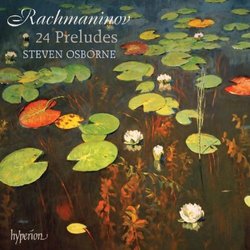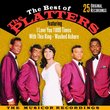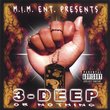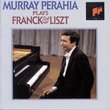| All Artists: Osborne Title: Rachmaninov: Preludes, Op. 23 Nos. 1-10, Op. 32 Nos. 1 - 13, Morceaux de fantaisie, Op. 3 No. 2 Members Wishing: 1 Total Copies: 0 Label: Hyperion Original Release Date: 1/1/2009 Re-Release Date: 5/12/2009 Album Type: Import Genres: New Age, Classical Styles: Instrumental, Chamber Music, Historical Periods, Classical (c.1770-1830) Number of Discs: 1 SwapaCD Credits: 1 UPC: 034571177007 |
Search - Osborne :: Rachmaninov: Preludes, Op. 23 Nos. 1-10, Op. 32 Nos. 1 - 13, Morceaux de fantaisie, Op. 3 No. 2
 | Osborne Rachmaninov: Preludes, Op. 23 Nos. 1-10, Op. 32 Nos. 1 - 13, Morceaux de fantaisie, Op. 3 No. 2 Genres: New Age, Classical No Description Available. Genre: Classical Music Media Format: Compact Disk Rating: Release Date: 12-MAY-2009 |
Larger Image |
CD DetailsSynopsis
Product Description No Description Available. Genre: Classical Music Media Format: Compact Disk Rating: Release Date: 12-MAY-2009 Similar CDs
Similarly Requested CDs |
CD Reviews(-) Another British Piano Record of the Year? C. Pontus T. | SE/Asia | 10/01/2009 (3 out of 5 stars) "On 3 October, the Gramophone Award winners for 2009 will be announced. Steven Osborne is nominated both in the Concerto and Instrumental categories. I have not heard the former disc--Britten's complete works for piano and orchestra (Britten: Piano Concerto; Diversions; Young Apollo). However, as to the latter, I have listened to it extensively and compared with copious other versions of Rachmaninov's Preludes. Knowing the British reviewers in combination with the fact that Paul Lewis's Beethoven Sonatas scooped last year's Record of the Year accolade, I would not be surprised at all to find this Osborne disc as this year's winner--it has already been showered with several accolades in the Kingdom. Obviously, we must be faced with one of the great piano discs of recent, right? Together with Chopin's Ballades and Nocturnes, Rachmaninov's Preludes constitute the most beautiful works written for the piano. It should, thus, come as no surprise that I own and/or have heard most extant versions of these priceless gems--as well as played some of them myself. Even if other British pianists from John Ogdon through Howard Shelley and Peter Donohoe have preceded Osborne in recording the 24 Preludes, they have all failed to capture the Rachmaninovian amalgamation of passion, nervousness, powerfulness and fiery brilliance. In this department, the great Russian pianists remain supreme. One cannot say that Osborne plays bad; at the same time, claiming this to be 'the winning ticket' (International Record Review), or at 'the top of the {recommended} list', (Fanfare, {Musical Opinion}), is either biased or outright ignorant. Osborne manages to make the vast majority of the Preludes sound virtually the same: the B-flat major hardly 'meastoso', the D major not much 'cantabile', the A-flat major barely 'vivace', the E minor certainly not 'con brio', and the F minor anything but 'appassionato'. Instead, they all come across as largely pleasant, smooth, unproblematic and ultimately quite dull. There is nothing of Gavrilov's blistering dexterity, Richter's balanced passion, or Alexeev's idiomatic perfection. Several British reviewers liken Osborne's Preludes to those of Ashkenazy, recorded some 25 years ago (Rachmaninov: 24 Preludes). Even if Ashkenazy is more individual and memorable, his streamlined approach indeed appears to have served as a model for Osborne. And just like his 'mentor', he is overall more successful in Op 32 than in Op 23; his C major, E major, A minor and A major Preludes are all very good. In my view, Steven Osborne may well be today's most overestimated pianist. Again, he is undeniably competent but just as his Debussy Preludes (Debussy: Préludes) and Liszt Harmonies (Liszt: Harmonies poétiques et religieuses), these Rachmaninov Preludes attest to the fact that there is absolutely nothing great whatsoever about his pianism. Therefore, I added the minus--although Hyperion's beautifully lifelike Henry Wood Hall sound needs a special mention. Let's hope that Bavouzet receives this year's award for the final instalment in his new reference Debussy series (Debussy: Complete Works for Piano, Vol. 4). TIMINGS: Op 3/2--4:51; Op 23--35:56; Op 32--37:38 REFERENCES: Gavrilov (Rachmaninov: Preludes/Moments Musicaux/Ravel: Gaspard de La Nuit), Richter (Sviatoslav Richter Plays Rachmaninoff), Alexeev (Rachmaninov: Preludes)" There is a reason why it won Editor's Choice from a magazine Theophilus | Ohio, U.S. | 10/20/2009 (4 out of 5 stars) "I have the Ashkenazy CD mentioned by the below Pontus. I find this CD quite handsome in its playing. ALL of the Preludes are done well, although I disagree with some of the interpretations. I find this one notch above Ashkenazy's playing, but a notch below what I would call unbelievable or mind-blowing. He plays with power when necessary, a fine technique, and discerning musicianship also. I do miss the melancholia that so permeates all of the works of Rachmaninoff. This trait is missing from Osborne's playing. The last of the Op. 32 Preludes, my favorite, lacks a finality to it that states the end to the composing of preludes in his lifetime. Ashkenazy goes for broke in this prelude and brings out all the voices, albeit a little percussively. But I think this CD does deserve its Editor's Choice from Gramaphone magazine. There are no real weaknesses, but it fails to enthrall me as truly exciting or scintillating." A Terrible Travesty Hannibal | Los Angeles, CA USA | 03/30/2010 (2 out of 5 stars) "It's sad that this dispiriting disc has received rave reviews from some in the British press, but it only proves that national boosterism is not dead.
Osborne may be talented, but certainly not when it comes to Rachmaninov. He hasn't a clue as to what the great Russian master is all about. Indeed, I have never head a pianist in more than 60 years of listening who is more ill-suited to this wonderful music than he. Osborne is dull and seems disinterested in the music itself. I gave this disc two stars to be kind. In truth, it barely deserves a star at all. I urge lovers of the preludes to choose recordings by virtually anyone else rather than to waste their money on this, a travesty best soon forgotten." |










